Is Improper Supervision to Blame for an Elderly Fall in a Nursing Home?
Abuse and Neglect, Nursing Home AbuseFalls are a leading cause of injury among elderly residents in nursing homes, and improper supervision often plays a significant role in these incidents. Ensuring that residents receive adequate supervision is crucial for preventing falls and ensuring their safety and well-being. When improper supervision is to blame for an elderly fall in a nursing home, the victim and their family members must hire a nursing home abuse lawyer to pursue compensation.
This blog explores the critical issue of improper supervision in nursing homes. You’ll learn how this problem contributes to elderly falls and the legal responsibilities of these facilities. We’ll also cover the importance of seeking legal help to hold negligent parties accountable and secure compensation for affected residents.
Why Supervision is So Critical to Fall Prevention
About 1.5 falls per nursing home bed occur yearly. Supervision plays a pivotal role in preventing falls in nursing homes, where residents are often at heightened risk due to age-related physical and cognitive impairments.
Proper supervision ensures that residents receive the necessary assistance with mobility, timely responses to their needs, and continuous monitoring to prevent accidents. Effective supervision is integral to maintaining the safety and well-being of nursing home residents.
The Legal Consequences of Negligent Supervision
If improper supervision is to blame for an elderly fall in a nursing home, a skilled attorney will help victims and their families pursue justice. Nursing homes must provide adequate supervision to ensure resident safety. When they fail to meet these standards, the consequences can be severe. These include:
- An increased risk of falls: Negligent supervision leads to higher rates of falls, resulting in serious injuries such as fractures, head injuries, and even fatalities.
- Legal liability: A nursing home lawyer can legally hold a facility accountable for failing to supervise sufficiently. The facility can face lawsuits, fines, and penalties.
- Compensation: Families of residents who suffer falls due to negligent supervision can seek compensation for medical expenses, pain and suffering, and other related damages.
The Physical and Emotional Impacts of Improper Supervision in Nursing Homes
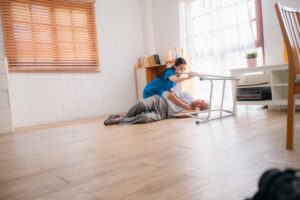
Falls in nursing homes are a pervasive problem, with improper supervision being a significant contributing factor. Chronic understaffing, affecting nearly 90 percent of nursing homes in the US, worsens this issue, leaving residents vulnerable to falls and ensuing consequences. The impact of such incidents extends beyond physical injuries, deeply affecting the emotional well-being of residents and their families.
Devastating Effects
The physical injuries from falls can range from minor bruises to severe fractures, head injuries, and even fatalities. Beyond the immediate physical harm, these incidents can lead to long-term health issues, decreased mobility, and a loss of independence.
When improper supervision is to blame for an elderly fall in a nursing home, the emotional impacts can be just as profound.
A fear of falling again can lead to anxiety, depression, and a loss of confidence in their ability to move around safely. This fear often results in reduced physical activity, further diminishing their strength and mobility, creating a vicious cycle that increases the risk of future falls.
The emotional trauma from a fall can lead to social withdrawal, feelings of helplessness, and a decline in overall mental health. Residents may feel abandoned or neglected, worsening feelings of isolation and loneliness. These psychological effects can significantly impact their overall well-being.
Legal Recourse
Families affected by falls due to improper supervision in nursing homes have legal recourse to seek justice and compensation. Legal action can hold facilities accountable for neglect and ensure they adhere to the required standards of care. An experienced nursing home abuse lawyer can gather the necessary evidence and build a solid case to prove negligence.
A skilled attorney can hold nursing homes accountable for their failures and secure compensation for medical expenses, pain and suffering, and emotional distress residents and their families experience.
How a Nursing Home Abuse Lawyer Investigates a Fall Due to Negligent Supervision
Improper supervision in nursing homes occurs when staff fail to adequately monitor and assist residents, creating conditions where falls are more likely to happen. This danger can result from understaffing, inadequate training, or neglectful behavior. When improper supervision is to blame for an elderly fall in a nursing home that leads to a severe injury, a nursing home abuse lawyer can thoroughly investigate.
Signs of Negligence
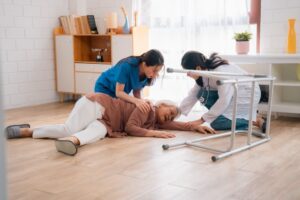
Identifying signs of negligent supervision is the first step in an attorney’s investigation. Key indicators include:
- Frequent or unexplained falls: A pattern of falls or injuries among residents can suggest inadequate supervision.
- Delayed response to call lights: If staff are slow to respond to residents’ requests for help, it indicates a lack of adequate supervision.
- Insufficient staffing: Again, chronic understaffing means fewer staff members are available to monitor and assist residents, increasing the risk of falls.
- Poorly maintained facilities: Cluttered hallways, poor lighting, and other environmental hazards can contribute to falls and reflect a lack of supervision.
- Resident reports: Statements from residents about being left unattended or not receiving needed assistance can be crucial in identifying neglect.
Evidence Collection
A nursing home abuse lawyer collects various types of evidence to build a strong case of negligent supervision, such as:
- Medical records: Documentation of injuries and medical treatment provides proof of the physical impact of the fall and can highlight patterns of neglect.
- Incident reports: Official reports from the nursing home detailing the circumstances of the fall can reveal inconsistencies or admissions of inadequate supervision.
- Staffing records: Information on staffing levels and staff-to-resident ratios helps demonstrate whether the facility had adequate staff during the incident.
- Surveillance footage: Video evidence from the nursing home can provide a clear picture of the level of supervision provided and the conditions leading to the fall.
- Expert opinions: Healthcare professionals and elder care experts can provide evaluations of the supervision standards and whether they meet legal and industry requirements.
You can’t overstate the importance of experienced legal representation when proving improper supervision is to blame for an elderly fall in a nursing home. A skilled nursing home abuse lawyer has the experience and skill to build a strong case.
How an Expert Can Help Prove Negligence
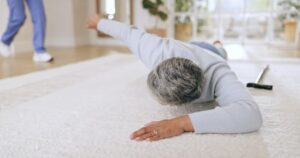
As stated earlier, proving negligence in cases of improper supervision in nursing homes often requires the insight and testimony of elder care experts. These professionals are crucial in helping victims and their families pursue compensation. They do this by providing specialized knowledge and credibility to support the claim. Here’s how an expert can assist in establishing negligence:
Evaluating Standards of Care
Elder care or nursing home administration experts can assess whether the facility met the industry standards of care. They can compare the nursing home’s practices with established guidelines and regulations, identifying deviations that may constitute negligence. Their evaluations help to demonstrate whether the supervision provided was adequate or fell below acceptable levels.
Analyzing Medical Records
Medical experts can review the resident’s medical records to correlate the injuries sustained with the alleged lack of supervision. They can explain how improper supervision is to blame for an elderly fall in a nursing home and the subsequent injuries. Their explanation will establish a clear link between the facility’s negligence and the harm caused. This medical analysis is essential for substantiating claims of neglect.
Providing Expert Testimony
Expert testimony can be pivotal in legal proceedings. Experts can present their findings in court, explaining complex medical or caregiving concepts understandably. Their testimony lends credibility to the claim, helping the court understand how improper supervision led to the resident’s injuries and validating the plaintiff’s arguments.
Identifying Systemic Issues
Experts can also identify broader systemic issues within the nursing home, such as chronic understaffing or inadequate training programs. By highlighting these systemic problems, they can strengthen the case that your family member’s injury wasn’t just an isolated incident. There’s a very high likelihood that improper supervision was to blame for the elderly victim’s fall in the nursing home.
Supporting Financial Compensation Claims
Experts can help quantify the impact of the facility’s negligence on the resident’s health and well-being. They can provide estimates of future medical costs, rehabilitation needs, and the overall effect on the resident’s quality of life, which are critical for calculating appropriate compensation.
Experts’ knowledge and credibility can help victims of improper supervision in nursing homes build a convincing case to prove negligence, secure compensation, and ensure accountability. If you suspect a loved one has suffered due to inadequate supervision, consulting with an experienced nursing home abuse lawyer and relevant experts is essential for pursuing justice.
Negotiating or Litigating to Obtain Compensation
Securing fair compensation often involves negotiations and, if necessary, litigation. A nursing home abuse lawyer is critical to these processes, protecting a victim’s rights and achieving justice.
The Negotiation Process
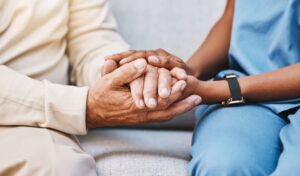
The negotiation phase typically begins with the nursing home abuse lawyer contacting the nursing home’s insurance company or legal representatives. Your attorney will present a detailed claim that includes evidence of negligence, medical records, expert opinions, and a thorough account of the fall’s impact on the victim’s health and well-being.
During negotiations, your lawyer will make a compelling argument that improper supervision was to blame for the elderly fall in the nursing home. They’ll highlight the nursing home’s duty of care and how they breached it due to understaffing, lack of proper training, or neglect. Your nursing home attorney will emphasize the physical, emotional, and financial toll on the victim and your family, seeking compensation for medical expenses, pain and suffering, and other related damages.
Key Negotiation Points
- The extent of negligence: Demonstrating that the nursing home’s inadequate supervision was a direct cause of the fall.
- The impact on the victim: Detailing the physical and emotional injuries sustained and their long-term effects.
- Financial compensation: Calculating the costs of medical treatment, rehabilitation, and potential future care needs.
- Accountability: Stressing the importance of holding the nursing home accountable to prevent future incidents.
Litigation
If negotiations don’t result in a fair settlement, your nursing home abuse lawyer will prepare to take the case to court. Litigation involves filing a lawsuit against the nursing home, where the lawyer will present the case before a judge and jury. Steps include the following:
- Gathering and presenting evidence: Compiling comprehensive evidence, including medical records, expert testimonies, and witness statements.
- Arguing the case: Making compelling arguments that clearly show the nursing home’s negligence and its direct link to the victim’s injuries.
- Seeking justice: Advocating for maximum compensation to cover all damages and holding the nursing home accountable.
Litigation can be lengthy and complex, but it often results in significant compensation and systemic changes in the nursing home. An experienced nursing home abuse lawyer will fiercely defend the victim’s rights, whether through negotiation or in the courtroom.
Why a Non-Lawyer Will Have Almost No Chance to Achieve Justice for Their Loved One
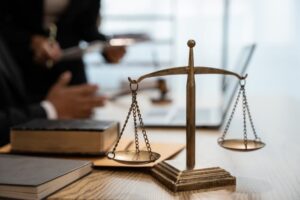
The complexities of nursing home abuse cases require a deep understanding of legal procedures, regulations, and evidence collection. Despite their best intentions, non-lawyers often lack the experience to advocate for their loved ones effectively. These are a few reasons a non-attorney will almost certainly lose their case.
- A lack of legal knowledge: Nursing home abuse cases involve intricate laws and regulations that govern the standards of care. A non-lawyer may not fully understand these legal requirements, making it difficult to prove negligence or hold the facility accountable.
- Evidence collection: Building a strong case requires gathering and presenting compelling evidence. A nursing home abuse lawyer has the skills and resources to collect and organize this evidence effectively, while non-lawyers might struggle to obtain and interpret critical documents.
- No negotiation skills: Negotiating with insurance companies and legal representatives demands experience and strategic thinking. Lawyers know how to negotiate settlements that reflect the true extent of damages. Non-lawyers may accept inadequate offers due to lack of experience and knowledge.
- No litigation experience: If negotiations fail, taking the case to court involves complex legal procedures and presenting a convincing argument before a judge and jury. Lawyers are adept at courtroom advocacy, while non-lawyers may find the process overwhelming and difficult to navigate.
Please Speak With a Nursing Home Abuse Lawyer Immediately
If improper supervision is to blame for an elderly fall in a nursing home that severely injured your loved one, taking action is critical. Proving negligence is essential to ensuring your family members obtain the compensation they deserve.
Contact an experienced personal injury lawyer today for a free consultation. They will use their extensive skills and knowledge to secure the compensation and justice your family deserves. Don’t wait. Please contact a local firm now to protect your loved one’s rights and well-being.
Nathan Hughey, an attorney and fourth-generation South Carolinian, founded Hughey Law Firm in 2007. Before that, he spent five years defending nursing homes and insurance companies. Leveraging his experience, he now advocates for those injured or wronged by such entities, securing over $290 million in verdicts and settlements.
